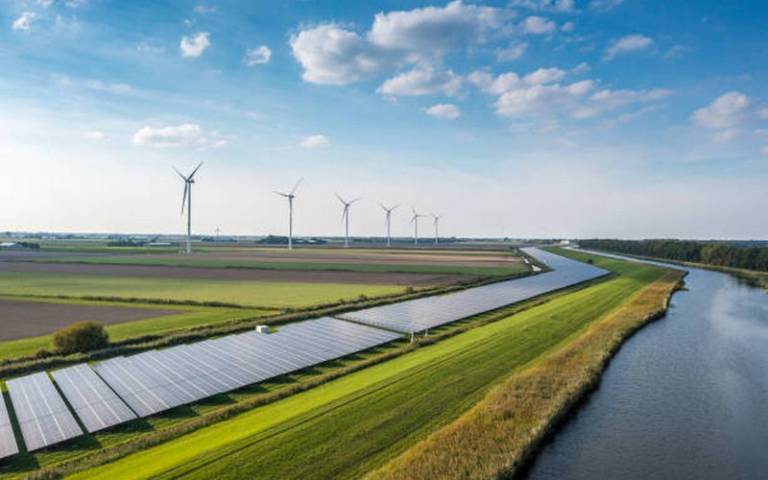New UCL master’s course to accelerate sustainable energy solutions
A new MSc at UCL East is teaching students how to design materials for use in technologies that can help create sustainable low-carbon solutions for transport, heat and energy production.

14 December 2023
The UN’s Intergovernmental Panel on Climate Change (IPCC) has advised that to keep global temperature rise below 1.5 degrees by 2030, greenhouse gas emissions must be reduced by 43%.
A new master’s course devised by Dr Prospero Taroni-Junior (UCL Institute for Materials Discovery) that focuses on designing new materials for sustainable technologies, will help address the urgent need to reduce global carbon emissions. The MSc in Advanced Material Sciences (Sustainability) will upskill material scientists and engineers to design materials for technologies that help improve the efficiency of renewable energy production and carbon-capture, as well as also reducing waste.
“Renewable energy production does not always equate to sustainable energy production,” Dr Taroni-Junior emphasises. “Biomass produces CO2 when burnt, and this needs to be captured; solar panels currently contain components that cannot be recycled; and computers produce heat that is wasted.”
The course includes two new taught modules, devised by Dr Taroni-Junior specifically to explore issues around sustainability. The modules are in Advanced Materials for Sustainable Energy Technologies and in Advanced Topics in Materials Science for Sustainable Developments.
On the new MSc, students also complete a six-month research project, where they have an opportunity to design new materials and explore design solutions to challenges such as waste heat recovery and polymer recycling using state-of-the-art facilities at the Marshgate building on the new UCL East campus.
By designing new materials, including metals, polymers and ceramics, and developing new ways to recycle them, circular models of production can be developed without the need for further material extraction. Carbon-capture technologies are also vital, even as fossil fuels are phased out, because bioenergy solutions that are likely to make up more than half of renewable energy sources by 2030 still emit significant carbon into the atmosphere.
We still need to design more efficient carbon-capture methods and this requires new materials that can react with carbon and remove it from the atmosphere.”
“Despite recent advances in renewable energy production, carbon capture will continue to be essential,” Dr Taroni-Junior explains. “We still need to design more efficient carbon-capture methods and this requires new materials that can react with carbon and remove it from the atmosphere.”
“Our ultimate goals are to link theory with practice for addressing global challenges and societal needs,” explains Dr Taroni-Junior. “We want our students to contribute to creating a sustainable future by design, through using materials with a lower environmental impact and higher durability.
 Close
Close


